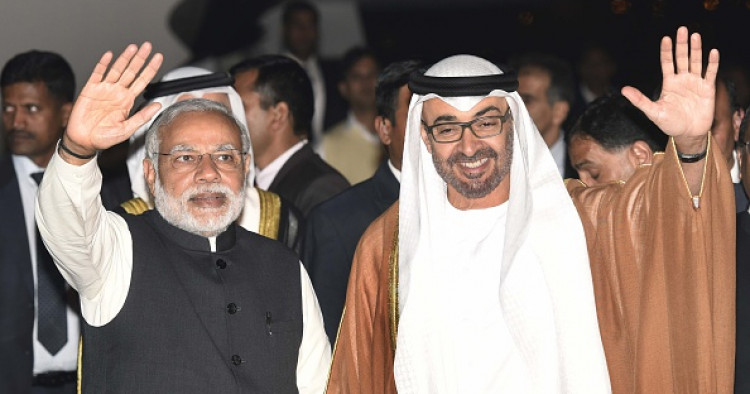Description

Copyright infringement not intended
Picture Courtesy: https://www.mei.edu/publications/india-uae-relations-poised-climb-new-heights
Context: The Prime Minister of India met with UAE President Sheikh Mohamed bin Zayed Al Nahyan in Abu Dhabi.
Key Highlights
Bilateral Talks
- One-on-one and delegation-level talks were held between Prime Minister Modi and President Sheikh Mohamed bin Zayed Al Nahyan. The leaders reviewed the bilateral partnership and explored new areas of cooperation.
Comprehensive Strategic Partnership
- The Comprehensive Strategic Partnership between India and the UAE was discussed, covering sectors such as trade, investment, digital infrastructure, fintech, energy, infrastructure, culture, and people-to-people ties.
Key Agreements and Memorandum of Understanding (MOUs)
- A Bilateral Investment Treaty was signed to promote investments in both countries.
- MOU on cooperation in the field of electrical interconnection and trade to enhance collaboration in energy, including energy security and trade.
- Intergovernmental Framework Agreement on the India-Middle East Economic Corridor to foster regional connectivity.
- MOU on cooperation in Digital Infrastructure Projects to facilitate investment cooperation in the digital infrastructure sector.
- A cooperation protocol between the National Archives of both countries for extensive bilateral cooperation in archival material restoration and preservation.
- MOU for cooperation in the field of heritage and museums to support the Maritime Heritage Complex at Lothal, Gujarat.
- Agreement on interlinking instant payment platforms UPI (India) and AANI (UAE) for seamless cross-border transactions.
- Agreement on interlinking domestic debit/credit cards RuPay (India) with JAYWAN (UAE) to enhance financial sector cooperation.

Energy Partnership
- Discussions on strengthening the energy partnership, with India entering into long-term contracts for LNG from the UAE.
- RITES Limited signed agreements with Abu Dhabi Ports Company and Gujarat Maritime Board to enhance port infrastructure and connectivity.
Cultural and Religious Ties
- The Indian PM thanked President Sheikh Mohamed bin Zayed Al Nahyan for his support in constructing the BAPS Temple in Abu Dhabi, a symbol of UAE-India friendship and cultural bonds.
- The BAPS Temple represents the UAE's commitment to harmony, tolerance, and peaceful coexistence.
Financial Sector Cooperation
- Inter-linking of domestic debit/credit cards RuPay (India) with JAYWAN (UAE) to boost financial sector cooperation and increase the acceptance of RuPay in the UAE.
Transaction Using JAYWAN Card
- Leaders witnessed a transaction made using the JAYWAN card, based on the digital RuPay credit and debit card stack.

Conclusion
- The visit aimed at strengthening bilateral ties across various sectors and enhancing cooperation between India and the UAE. The agreements and MOUs signed reflect a commitment to economic, cultural, and technological collaboration between the two nations.
Must Read Articles:
INDIA UAE RELATIONS: https://www.iasgyan.in/daily-current-affairs/india-uae-relations#:~:text=In%20FY%202021%2D22%2C%20the,in%20effect%20May%201%2C%202022.
|
PRACTICE QUESTION
Q. While India enjoys strong security ties with the UAE, there have been concerns about human rights issues in the Gulf nation. How can India navigate this balance, ensuring its security interests are met while advocating for human rights?
Answer Structure:
●Start with a brief introduction that summarizes the main points of the question and provides some background information on the security and human rights situation in the UAE.
●Explain the benefits and challenges of India's security ties with the UAE, such as counter-terrorism cooperation, energy security, trade and investment, and regional stability.
●Analyze the human rights issues in the UAE that India may be concerned about, such as migrant workers' rights, freedom of expression, women's rights, and religious tolerance.
●Discuss how India can balance its security interests and human rights advocacy in the UAE, considering factors such as its strategic partnership, its diaspora community, its international reputation, and its values and principles.
●Conclude with a summary of the main arguments and some recommendations or suggestions for future actions or policies.
|














